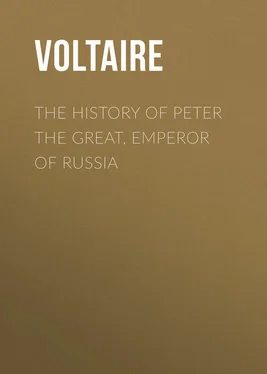Voltaire - The History of Peter the Great, Emperor of Russia
Здесь есть возможность читать онлайн «Voltaire - The History of Peter the Great, Emperor of Russia» — ознакомительный отрывок электронной книги совершенно бесплатно, а после прочтения отрывка купить полную версию. В некоторых случаях можно слушать аудио, скачать через торрент в формате fb2 и присутствует краткое содержание. Жанр: История, literature_18, foreign_prose, на английском языке. Описание произведения, (предисловие) а так же отзывы посетителей доступны на портале библиотеки ЛибКат.
- Название:The History of Peter the Great, Emperor of Russia
- Автор:
- Жанр:
- Год:неизвестен
- ISBN:нет данных
- Рейтинг книги:3 / 5. Голосов: 1
-
Избранное:Добавить в избранное
- Отзывы:
-
Ваша оценка:
- 60
- 1
- 2
- 3
- 4
- 5
The History of Peter the Great, Emperor of Russia: краткое содержание, описание и аннотация
Предлагаем к чтению аннотацию, описание, краткое содержание или предисловие (зависит от того, что написал сам автор книги «The History of Peter the Great, Emperor of Russia»). Если вы не нашли необходимую информацию о книге — напишите в комментариях, мы постараемся отыскать её.
The History of Peter the Great, Emperor of Russia — читать онлайн ознакомительный отрывок
Ниже представлен текст книги, разбитый по страницам. Система сохранения места последней прочитанной страницы, позволяет с удобством читать онлайн бесплатно книгу «The History of Peter the Great, Emperor of Russia», без необходимости каждый раз заново искать на чём Вы остановились. Поставьте закладку, и сможете в любой момент перейти на страницу, на которой закончили чтение.
Интервал:
Закладка:
Russia was now quiet at home, but she was still pent up on the side of Sweden, though enlarged towards Poland, her new ally, in continual alarms on the side of Crim Tartary, and at variance with China in regard to the frontiers.
The most intolerable circumstance for their empire, and which plainly shewed, that it had not yet attained to a vigorous and regular administration, was, that the khan of the Crim Tartars exacted an annual tribute of 6000 rubles, in the nature of that which the Turk had imposed on the Poles.
Crim Tartary is the ancient Taurica Chersonesus, formerly so famous by the commerce of the Greeks, and still more by their fables, a fruitful but barbarous country. It took its name of Crimea, or Crim, from the title of its first khans, who took this name before the conquests of the sons of Gengis Khan. To free his country from this yoke, and wipe off the disgrace of such tribute, the prime minister, Galitzin, marched in person (1687, 1688,) into Crim Tartary, at the head of a numerous army. These armies were not to be compared to the present troops; they had no discipline; there was hardly one regiment completely armed; they had no uniform clothing, no regularity: their men indeed were inured to hard labour and a scarcity of provisions, but then they carried with them such a prodigious quantity of baggage, as far exceeded any thing of the kind in our camps, where the greatest luxury prevails. Their vast numbers of waggons for carrying ammunition and provisions, in an uninhabitable and desert country, greatly retarded the expedition against Crim Tartary. The army found itself in the midst of the vast deserts, on the river Samara, unprovided with magazines. Here Galitzin did what in my opinion, was never done any where else: he employed thirty thousand men in building a town on the banks of the Samara, to serve as a place for magazines in the ensuing campaign: it was begun in one year, and finished in the third month of the following; the houses indeed were all wood except two, which were brick; the ramparts were of turf, but well lined with artillery; and the whole place was in a tolerable state of defence.
This was all that was done of any consequence in this ruinous expedition. In the mean while Sophia continued to govern in Moscow, while John had only the name of czar; and Peter, now at the age of seventeen, had already the courage to aim at real sovereignty. La Neuville, the Polish envoy, then resident at Moscow, and who was eye-witness to all that passed, pretends that Sophia and Galitzin had engaged the new chief of the strelitzes, to sacrifice to them their young czar: it appears, at least, that six hundred of these strelitzes were to have made themselves masters of his person. The private memoirs which have been entrusted to my perusal by the court of Russia, affirm, that a scheme had actually been laid to murder Peter the First: the blow was on the point of being struck, and Russia for ever deprived of the new existence she has since received. The czar was once more obliged to take refuge in the convent of the Trinity, the usual asylum of the court when threatened by the soldiers. There he assembled the boyards of his party, raised a body of forces, treats with the captains of the strelitzes, and called in the assistance of certain Germans, who had been long settled in Moscow, and were all attached to his person from his having already shewn himself the encourager of strangers. Sophia and John, who continued at Moscow, used every means to engage the strelitzes to remain firm to their interests; but the cause of young Peter, who loudly complained of an attempt meditated against himself and his mother, prevailed over that of the princess, and of a czar, whose very aspect alienated all hearts. All the acomplices were punished with a severity to which that country was as much accustomed as to the crimes which occasioned it. Some were beheaded after undergoing the punishment of the knout or battocks. The chief of the strelitzes was put to death in the same manner, and several other suspected persons had their tongues cut out. Prince Galitzin escaped with his life, through the intercession of one of his relations, who was a favourite of czar Peter; but he was stripped of all his riches, which were immense, and banished to a place in the neighbourhood of Archangel. La Neuville, who was present at the whole of this catastrophe, relates, that the sentence pronounced upon Galitzin was in these terms: 'Thou art commanded, by the most clement czar, to repair to Karga, a town under the pole, and there to continue the remainder of thy days. His majesty, out of his extreme goodness, allows thee three pence per day for thy subsistence.'
There is no town under the pole. Karga is in the 62nd degree of latitude, and only six degrees and a half further north than Moscow. Whoever pronounced this sentence must have been a very bad geographer. La Neuville was probably imposed upon by a false account.
1689.] At length the princess Sophia was once more sent back to her monastery at Moscow, 28 28 How are we to reconcile this with what the author tells us in the latter part of the third chapter, where he says, that this princess, perceiving that her brother Theodore was near his end, declined retiring to a convent, as was the usual custom of the princesses of the imperial family.
after having so long held the reins of government; and this revolution proved, to a woman of her disposition, a sufficient punishment.
From this instant Peter began to reign in reality; his brother John having no other share in the government, but that of seeing his name to all public acts. He led a retired life, and died in 1696.
CHAP. VI
The reign of Peter the First. – Beginning of the grand reformation.
Peter the Great was tall, genteel, well made, with a noble aspect, piercing eyes and a robust constitution, fitted for all kinds of hardship and bodily exercise. He had a sound understanding, which is the basis of all real abilities; and to this was joined an active disposition, which prompted him to undertake and execute the greatest things. His education was far from being worthy of his genius. The princess Sophia was, in a peculiar manner, interested to let him remain in ignorance, and to indulge himself in those excesses which youth, idleness, custom, and the high rank he held, made but too allowable. Nevertheless, he had been lately married, (June 1689) like others of his predecessors, to one of his own subjects, the daughter of colonel Lapuchin; but, as he was young, and for some time enjoyed none of the prerogatives of the crown, but that of indulging his pleasures without restraint, the ties of wedlock were not always sufficient to keep him within just bounds. The pleasures of the table, in which he indulged himself rather too freely, with foreigners, who had been invited to Moscow by prince Galitzin, seemed not to presage that he would one day become the reformer of his country; however, in spite of bad examples, and even the allurements of pleasure, he applied himself to the arts of war and government, and which, even then, shewed that he had the seeds of greatness in him.
It was still less expected, that a prince, who was subject to such a constitutional dread of water, as to subject him to cold sweats, and even convulsions, when he was obliged to cross a small river or brook, should become one of the best seamen in all the north. In order to get the better of nature, he began by jumping into the water, notwithstanding the horror he felt at it, till at length this aversion was changed into a fondness for that element. 29 29 We find, in the memoirs of count Strahlemberg, a Swedish officer, who was taken prisoner at the battle of Pultowa, and continued many years at the court of czar Peter, the following account of the true cause of this extraordinary kind of hydrophobia. When Peter was about five years of age, his mother took him with her in a coach for an airing, and having to pass a dam, where there was a great fall of water the child, who was then sleeping in his nurse's lap, was so terrified by the rushing of the water (the noise of which waked him suddenly out of his sleep), that he was seized with a violent fever, and, after his recovery, he retained such a dread of that element, that he could not bear the sight even of any standing water, much less to hear a running stream.
Интервал:
Закладка:
Похожие книги на «The History of Peter the Great, Emperor of Russia»
Представляем Вашему вниманию похожие книги на «The History of Peter the Great, Emperor of Russia» списком для выбора. Мы отобрали схожую по названию и смыслу литературу в надежде предоставить читателям больше вариантов отыскать новые, интересные, ещё непрочитанные произведения.
Обсуждение, отзывы о книге «The History of Peter the Great, Emperor of Russia» и просто собственные мнения читателей. Оставьте ваши комментарии, напишите, что Вы думаете о произведении, его смысле или главных героях. Укажите что конкретно понравилось, а что нет, и почему Вы так считаете.












